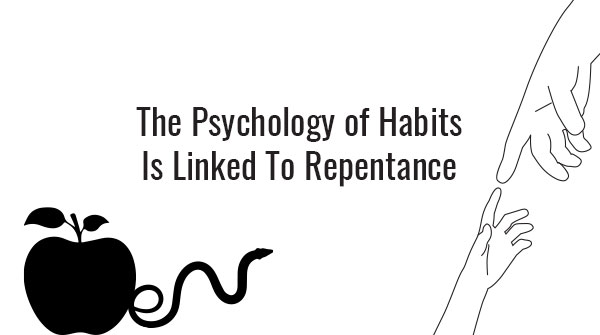
James Clear explains in his book Atomic Habits, ”It’s hard to change your habits if you never change the underlying beliefs that led to your past behavior. You have a new goal and a new plan, but you haven’t changed who you are…the key to change, then is identity change.”
“True behavior change is identity change…For example, instead of saying, ‘I’m trying to stop smoking,’ say, ‘I’m not a smoker.’ “
Habit Change Steps Sounds Like Biblical Repentance
To me, this sounds just like the recipe for repentance from sin. Biblical repentance is to turn from something and to something else. And it comes through identity in Christ. Your identity in Christ changes your belief which in turn changes you inside and out.
Psychology of Habits Is First Identity Change
It is good that the psychology behind habits are coming to realize that it is about adopting an identity, and that you don’t even need to feel like it, instead, you need to practice new habits in line with whatever identity you want to assume. This recognition and acknowledgement is that identity is ultimately realized by people who do actions in line with that identity. And we see change as directly linked to action, in this case, through small incremental habit change.
This Teaching Sounds Like Paul
This truth is designed into human nature and the human psychology of habits can help us fill in the details of what scripture is saying and how to apply it to our everyday life. This reflects Paul’s teaching in Romans 6:12 – 13, “Let not sin therefore reign in your mortal body, to make you obey its passions. Do not present your members to sin as instruments for unrighteousness, but present yourselves to God as those who have been brought from death to life, and your members to God as instruments for righteousness.”
Our theological explanation of Christian identity comes from the Bible but there can be practical guidance through other books and resources that help us understand how this plays out. Atomic Habits certainly helped me understand more how it works in daily life a lot more than many commentaries. This is one of the concerns I have with Christian books is their focus on theology while often not connecting it well enough to reality.
Theology of Sin and Human Psychology of Habit Change
Of course, I understand why Christian books would major on theology and not move into practicality, because it meets conflicting viewpoints in the culture. For example, a connection between identity and habit raises questions about Christians that identify as “being gay and Christian” or saying “I am an alcoholic”. It is healthy as an alcoholic to admit that there is a problem. Changing a habit begins by learning what is at the root of the sin. Why is this influencing your behavior? What are you believing that is not true? Changing your identity replaces pride, fear, shame, self-pity, etc to belief and confidence in who God is in you. An alcoholic is not who you are, it is just what defines you at the moment. It is not your identity. Making sinful temptation part of our identity does not allow us to see past the sin in defeat to give up the practice. The truth is, even though you don’t feel like it, you can overcome through “Christ who strengthens me”. I’m not saying it’s easy, but it is an identity that leads to repentance and long-term change. You must believe before you can see. As the movie Santa Clause helps us understand “Seeing is not believing. Believing is seeing.” I hope that I’m proving my point, that practical learnings can come from human, non-theological, places. In reality, everything points back to God and the repentance that we have available in Him.
1 Cor 10:13 “No temptation has overtaken you that is not common to man. God is faithful, and he will not let you be tempted beyond your ability, but with the temptation he will also provide the way of escape, that you may be able to endure it.”
This sounds similar to what the author of Atomic Habits writes: “Becoming the best version of yourself requires you to continuously edit your beliefs, and to upgrade and expand your identity”.
